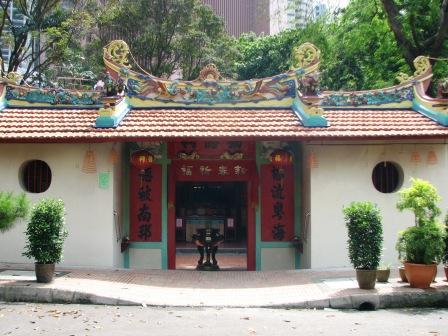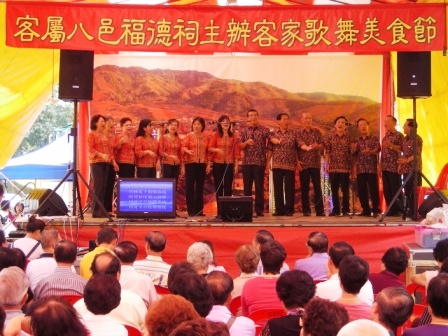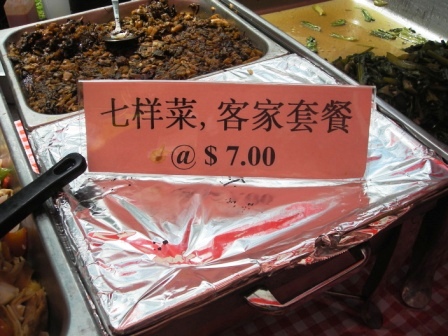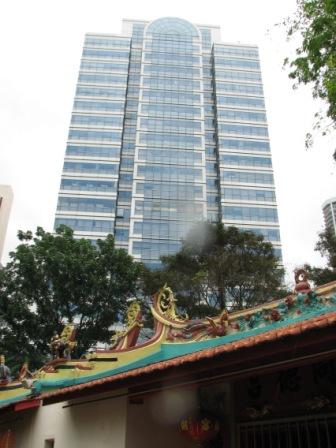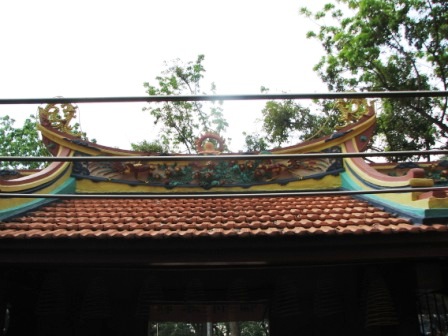Hakka Song & Food Festival
客家歌舞,美食节
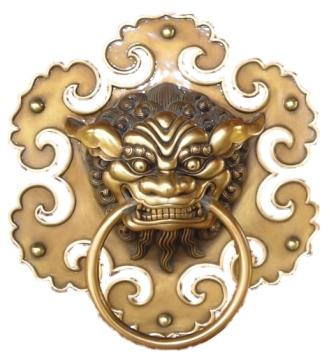 On 23 December 2007, Sunday, Fook Tet Soo Hakka Temple, 福德祠大伯公庙 at Palmer Road organised the Hakka Song & Food Festival 客家歌舞,美食节. On 23 December 2007, Sunday, Fook Tet Soo Hakka Temple, 福德祠大伯公庙 at Palmer Road organised the Hakka Song & Food Festival 客家歌舞,美食节.
A tentage was set up in front of the temple with stalls spaces, eating area as well as a stage for song and dance performances. The day started with song and dance programs and stalls showcasing the best of Hakka food culture with dishes such as Thunder tea rice, Chinese chives vermicelli, Hakka tofu, basil chicken with eggs, basil omelet, black bean cakes, beef ball soup, pastries and Hakka set dishes.
These signature Hakka dishes were prepared by well known Hakka restaurants including the Plum Village Restaurant 梅村酒家, Thunder Tea Rice 雷茶, Kew catering services 丘园.
Many visitors attended the festival as a family, and were busy choosing the food they like before sitting down to enjoy the song and dance programs. For some of the families, it was also a family gathering with grandparents, parents and grand children enjoying the food and entertainment together.
The festival also attracted non Hakka visitors and for those who were not familiar with Hakka food, some stalls offered food sample for visitors to try.
Just after noontime, the Guest of Honor, Member of Parliament (MP) for Jalan Besar GRC, Dr. Lily Neo arrived. The organizers took this opportunity to present a S$10, 000 cheque to the Kreta Ayer Kim Seng Community Fund. This cheque was presented to Dr. Lily Neo. Another cheque of S$10 000 was given to promote Hakka cultural activities.
This festival created a unique experience for many visitors. To enjoy Hakka food and listen to Hakka Songs is a form of cultural transmission to the younger generation. As the children chose the food or ate the food their parents bought, stories are also told of the origins of these foods or how they were prepared.
Similarly as the Hakka songs were being sung, it was an opportunity for parents to explain these songs to children. These interactions created conditions possible for cultural transmission through experiences as opposed to classroom lectures or books.
Another layer of experience was the location. Fook Tet Soo Hakka Temple probably predated the arrival of British in this region. It was also recorded by Dr. Leon Comber in his book, Chinese Temples in Singapore.
Enjoying traditional food, listening to Hakka song and watching the performances right in front of a historical temple intensifies the cultural experience.
Although known as a “Hakka Song & Food Festival”, the event was not restricted to Hakkas only. In fact, many visitors were not Hakka and it allowed them to engage in a Hakka cultural experience. This spirit of openness, reaching out and sharing of cultural experience reflects a management committee who are creative, forward looking and who actively explore ways to share Hakka cultural experiences.
The management committee also used this celebration to share with larger society through the donation to Kreta Ayer Kim Seng Community Fund.
This year’s festival is also very significant as the temple awaits its status and future. The committee member had applied to the authorities to gazette the temple as a National Monument. The results will be announced next year.
This is an important part of Singapore’s historical fabric and should be preserved for future generations. We hope in 2008, another Hakka Food Festival will happen in front of the Fook Tet Soo Hakka Temple as a cultural event and also as a celebration for their successful gazette as a National Monument.
Related Articles:
|


